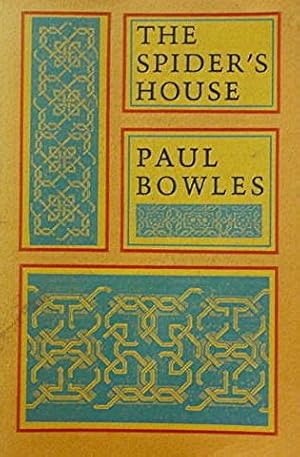Bowles' novel takes its title from a line of the Quran: "The likeness of those who choose other patrons than Allah is as the likeness of the spider when she taketh unto herself a house, and lo! the frailest of all houses is the spider's house, if they but knew." The mid-century Morocco he writes about is certainly fragile, as decades of French rule are beginning to boil over into violence. Bowles follows a young Muslim man and an older, American ex-pat in the city of Fez as both are caught up in this violence and thrust together.
Like in The Sheltering Sky, Bowles makes the reader wait a long time for what you might call "the good stuff." Like that book, it takes a long time for the promised clash between white foreigner and Muslim native to come. Bowles follows Amar, the Muslim, and Stenham, the ex-pat in parallel stories for almost 200 pages until they come upon each other in a cafe outside the city walls of Fez, where a sudden outpouring of violence means they are shut out of the city together. Amar and Stenham like each other--on the one side, a kind of respect, and the other a paternalistic compassion--but Bowles shows how difficult it is for white colonials and Muslims to really speak to each other, so different are their worldviews:
"Do you hate them?" the man asked; he was leaning forward, looking at Amar with intensity. There was no one there but the two of them; if the man turned out to be a spy he would at least have no witnesses. But that was an extreme consideration: Amar was positive he was only an onlooker. "Yes, I hate them," he said simply. "That's written, too."
"You have to hate them, you mean? You can't decide: I will or I won't hate them?"
Amar did not completely understand. "But I hate them now," he explained. "The day Allah wants me to stop hating them, He'll change my heart."
The man was smiling, as if to himself. "If the world's really like that, it's very easy to be in it," he said.
"It will never be easy to be in the world," Amar said firmly. "Er rabi mabrhach. God doesn't want it easy."
Moments later, Amar thinks:
The Nazarene had understood nothing at all; Amar's spirits sank as he perceived the gap that lay between them. If a Nazarene with so much good will and such a knowledge of Arabic was unable to grasp even the basic facts of such a simple state of affairs, then was there any hope that any Nazarene would ever aid any Moslem?
These conversations seem especially relevant today; I feel like I only have to scroll through Facebook for a few minutes to find someone coming to fundamentally backwards conclusions about Muslims or Islam. Bowles understands how the image we have of the Other in our minds often says more about us than it does about them; even Stenham, who likes Morocco, is inerrantly condescending and racist toward Moroccans. He laments the slow loss of the medieval quality of the city of Fez, even as he blames the locals for being trapped in the regressive attitudes of the past. The principal female character, a woman named Lee, holds the opposite view: anti-colonial revolution will bring the people of Morocco into an idealistic, and specifically Communist, future. These attitudes, Bowles shows us, have much to do with the private moral and ethical codes of whites and little to do with the people in Morocco whose future is actually in question
The third act of The Spider's House doesn't have the shocking or propulsive quality of The Sheltering Sky; it sort of peters out. In the end, Amar and Stenham's lives intertwine only briefly, touching in oblique ways, without much consequence. Probably that's the way that Bowles meant it to be.


No comments:
Post a Comment